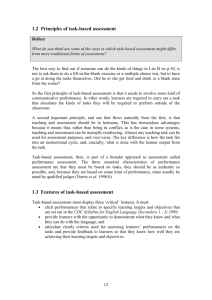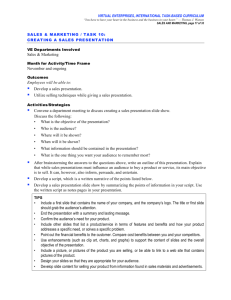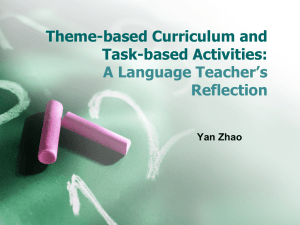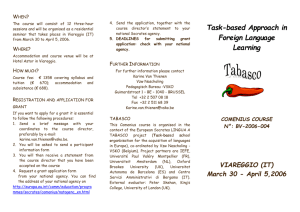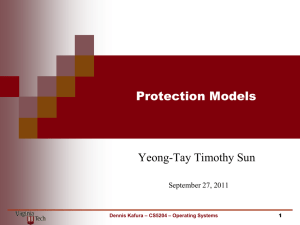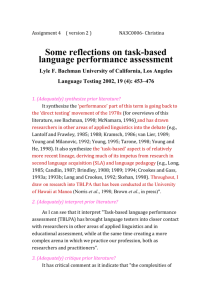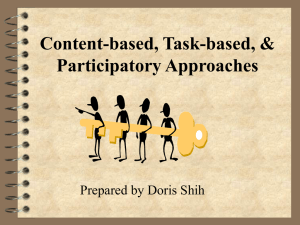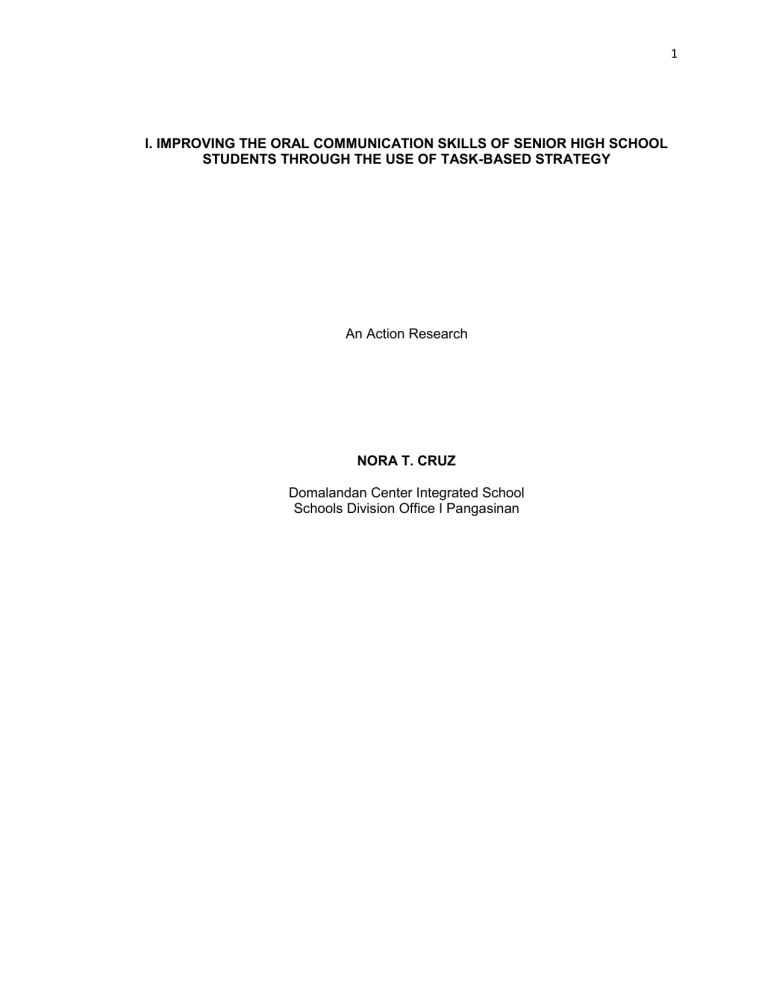
1 I. IMPROVING THE ORAL COMMUNICATION SKILLS OF SENIOR HIGH SCHOOL STUDENTS THROUGH THE USE OF TASK-BASED STRATEGY An Action Research NORA T. CRUZ Domalandan Center Integrated School Schools Division Office I Pangasinan 2 II. Abstract Notably, students stand to accomplish a wide range of goals when basic instruction and opportunities to practice speaking are made available to them in class. Relative to this, oral communication brings to fruition task-based approach which makes use of the target expressions or language functions in the carrying out of task-types. Utilizing the results of the pre- and post tests in Oral Communication after using taskbased approach, this study looked into the level of oral communication skills of the Grade 11 General Academic Strand students of Domalandan Center Integrated School this school year 2018- 2019. Although the results showed that the overall rating before using task-based strategies were satisfactory, it was noteworthy that majority of the students proved to be outstanding in their performance after the use of task-based activities. Likewise, it also showed that the level of oral communication skills of the Grade 11 GAS students significantly differed before and after using task-based strategy/. From hereon, the results of the study indicated that students worked best in instructional formats that best suit their learning styles. Thus; teachers, are called to task to exploit the role of tasks in students’ higher motivation in classroom language learning. Similarly, it also called on the teachers, to develop alternative methods in aid of creating more effective learning environment. Keywords fluency, intervention, language structures, oral communication, simulation task-based speaking strategy 3 III. Acknowledgment The entirety of this work is not made possible without the people who are instrumental in enabling me to finish this study. It is just fitting that I give due recognition to the contribution they have extended for the successful completion of this work. The researcher would like to express her profound thanks and grateful appreciation to all who have given their support, assistance, and efforts in the completion of this study. Dr. Arlyn V. Garcia, PSDS, for her insightful advice for the completion of this study; The researcher would like to express her sincere gratitude to her school head, Dr. Carina C. Untalasco, Principal IV, who was extremely helpful and offered invaluable assistance, support, and guidance. The researcher could not have imagined having a more competent school head and mentor for her study. Deepest gratitude also goes to the members of the faculty at Domalandan Center Integrated School, for the support, suggestions, kindness, and encouragement which motivated the researcher to complete this fruit of labor; Her sincere thanks to all her friends. In particular, she is grateful to Grace, Cristina, Blesilda, Zarley, Imelda, Jocelyn, Ednalyn, Janine and Richard, for the support and encouragement they have extended; This study would not be complete without mention of the support given to her by her mother, siblings, nieces and nephews; Gerald R. Valdez, who always serves as her inspiration; 4 Above all, to God Almighty, for His divine love for making this possible and for bestowing His blessings and divine guidance while the researcher is conducting the research. NTC 5 IV. CONTEXT AND RATIONALE The K to 12 Basic Education Curriculum Framework clearly states the need of developing the oral communication skills of students in preparation for the world of work, entrepreneurship and/or pursuing higher education. More so, communication skill is known to be one among the 21st century skills a learner should be equipped with. Recognizing this has led a major shift in the education sector that enhances the basic education curriculum through adding two years with high hopes to master the competences needed by a learner (RA 10533). In the recently conducted unit test, item analyses revealed that students of General Academic Strand obtained low mean performance. Recognizing the importance of oral communication in this strand, the researcher aimed to improve the Oral Communication Skills of Grade 11 GAS students through a task-based strategy called simulations. Simulations give students the chance to apply theory, develop critical skills, and provide a welcome relief from the everyday tasks of reading and preparing for classes (Kanner, 2007). An additional benefit of many of these simulations is the introduction of an aspect of realism into the students’ experience. Such simulations are historically seen in the medical fields, where mock-up patients take on the signs and symptoms of a certain disease or injury and the student is asked to assess, diagnose, and/or treat the patient. Here the students must apply what they have learned to a reasonably realistic scenario. Further, there is evidence that the experiential learning that occurs in simulations promotes long-term retention of course material (Bernstein & Meizlish, 2003; Brookfield, 1990). 6 Several researchers such as Nunan (2004), Ellis (2003) agreed that simulation view of language teaching is based on constructivist theory of learning. In the area of constructivism, Jean Piaget (2001) agreed that humans generate knowledge and meaning from an interaction between the students’ experiences and their ideas with full of tasks best exemplify learning. It is clear that if learners are to develop the competence they need in order to use a second language easily and effectively in the kinds of situations they meet outside the classroom, they need to experience how language is used as a tool for communication within it. It was in this context that the researcher conducted this study. It aimed to improve the oral communication skills of the Grade 11 GAS students at Domalandan Center Integrated School in order to fully equip the learners in responding accordingly to different communication situations as reflected in the task-based activities. V. innovation, Intervention, and Strategy Task-Based Activities as Alternative Instructional Teaching Method Richards and Rodgers (2001) define task-based instruction as an approach in which communicative and meaningful tasks play central role and in which the process of using language appropriately carries more importance than the mere production of grammatically-correct language forms. It basically involves conveying meaning via language. It is in this vein that task-based instruction is viewed as a model of Communicative Language Teaching in terms of regarding real and meaningful communication as the primary feature of language learning. OC11.4 7 Types of Speeches A. According to purpose o Expository/Informative Speech o Persuasive Speech o Entertainment Speech 25 hours/ 5 weeks Task Type: Simulation Task/Activity: They deliver a speech in front of an audience. B. According to delivery o Reading from a manuscript o Memorized Speech o Impromptu Speech o Extemporaneous Speech VI. Action Research Questions This study aimed to assess the influence of task-based strategy in improving the Oral Communication Skills of Grade 11 GAS students at Domalandan Center Integrated School this school year 2018 – 2019. Specifically, it aimed to answer the following: 1. What is the level of Oral Communication skills of the Grade 11 GAS students before using task-based strategy? 2. What is the level of Oral Communication skills of the Grade 11 GAS students after using task-based strategy? 3. Is there a significant difference in the level of Oral Communication skills of Grade 11 GAS students before and after using task-based strategy? VII. Action Research Methods a. Participants and/or other Sources of Data and Information The Grade 11 General Academic Strand students enrolled in the subject, Oral Communication in Context during the First Semester, Academic Year 2018-2019 at DCIS, served as participants of the study. 8 VIII. Discussion of Results and Reflection Performance of the Students in Oral Communication Before and After Exposure to Scaffolding Strategies The students’ performance in Oral Communication in Context was assessed after their exposure to the utilization of task-based strategies. Table 3 shows whether there was a difference on the performance of the Grade 11 GAS students before and after the utilization of task-based strategies. Table 3 Difference on the level of Oral Communication Skills of the Grade 11 Students Before and After the Utilization of Task-based Strategy N Mean Std. Deviation T Sig. 36 21.6 8.99 36 40.44 5.78 -10.73 .00001 The data in the table indicated that there was a statistically significant difference in their mean scores before and after utilization and/or exposure to task-based strategy. This is because the computed t- value is -10.73 while the p- value is .00001 which means that the result is significant at p<.05. Thus, there is a significant difference in the performance of the students in Oral Communication in Context before and after the intervention or utilization of the innovation, the task-based strategy. The change or increase in the rating after the use of task-based strategies show that their attitude towards the tasks and the implementation was both positive and encouraging. This was affirmed by the significant difference in the level of oral communication skills of the Grade 11 GAS students before and after the use of taskbased strategy. From the results of the study, teachers handling English classes can take inspiration from the employment of task-based strategies that target the oral 9 communication skills of the students. In so doing, the intervention not only addressed the low performance of the students in Oral Communication in Context. It also provided a medium where students can best develop if not enhance their oral communication skills. Conclusion The results of the study indicate that students work best in instructional formats that best suit their learning styles. We, teachers, are then called to task to exploit the role of tasks in students’ higher motivation in classroom language learning. Likewise, the results of the study calls on us, teachers, who are at the forefront of instruction, to develop alternative methods in aid of creating more effective learning environment. IX. Action Plan Date January 2226-2019 January 29February 2, 2019 March 26-30, 2019 April 2- 13, 2019 Activity Submission of the tight-copy of the research conducted to the Division Committee on Research. Coordination with the School Head for the issuance of memorandum encouraging the SHS teachers to adopt the results of the study. Getting feedbacks from the teachers who adopted the results of the study. Writing reports on the adoption of the task-based strategy and submitting it to the committee on research. Persons Involved Division Committee on Research Principal, Teachers Oral Communication in Context Teachers Committee on Research X. References Bernstein, J. L., & Meizlish, D. S. (2003). Becoming Congress: A longitudinal study of the civic engagement implications of a classroom simulation. Simulation & Gaming, 34(2): 198–219. Ellis, R. (2003). Task-based Language Learning and Teaching. Oxford: Oxford University Press. 10 Kanner, M. D. (2007). War and peace: Simulating security decision making in the classroom.PS: Political Science & Politics, 40(04), 795–800. Nunan, D. (2004). “Aspect of task-based syllabus design”. [Available online]. Richards, C. J. and Rodgers, T. S. (2001) Approaches and Methods in Language Teaching. Cambridge: Cambridge University Press. Willis, D. & Willis, J.. (2001). Task-based language learning. In: Carter, R. & Nunan, D.. (Eds.). The Cambridge guide to teaching English to speakers of other languages.Cambridge: Cambridge University Press. Yorke, M. and Knight, P. (2006) Self-theories: some implications for teaching and learning in higher education. Studies in Higher Education, 29 (1), 2537. Financial Report Type of Research : Action Research Duration : June 2018 to April 2019 Expenses Item Amount 2 hp deskjet black cartridge P990.00 2 hp deskjet colored cartridge P1000.00 11 4 reams short bond paper P1,100.00 10 blue short folders P138.00 10 plain short folders P50.00 1 pack paper fastener P38.00 photocopy of teacher-made test P375.00 binding of research proposal P1000.00 Transportation (gas) P3000.00 TOTAL P 7,691.00 Prepared by: Noted: Nora T. Cruz Master Teacher II Carina C. Untalasco, Ph.D Principal IV ANNEX 1: Research Proposal Application Form and Endorsement of Immediate Supervisor A. RESEARCH INFORMATION RESEARCH TITLE: IMPROVING THE ORAL COMMUNICATION SKILLS OF SENIOR HIGH SCHOOL STUDENTS THROUGH THE USE OF TASK-BASED STRATEGY SHORT DESCRIPTION OF THE RESEARCH The study looked into the influence of task-based strategy in improving the oral communication skills of the Grade 11 GAS students of Domalandan Center Integrated School. It was anchored on the competencies and content areas of the Oral Communication in Context curriculum and incorporated the 12 utilization of simulations and/or task-based strategies reflective of speech styles and communication contexts. The utilization of such was aimed at helping students improve their skills in oral communication. RESEARCH CATEGORY (check only one) o National o Region o Schools Division o District o School (check only one) o Action Research o Basic Research RESEARCH AGENDA CATEGORY (check only one research theme) o Teaching and Learning o Child Protection o Human Resource Development o Governance (check up to one cross-cutting theme, if applicable) o DRRM o Gender and Development o Inclusive Education o Others (please specify): __________ FUND SOURCE Personal AMOUNT P7, 691.00 TOTAL AMOUNT P7, 691.00 B. PROPONENT INFORMATION LEAD PROPONENT / INDIVIDUAL PROPONENT LAST NAME: FIRST NAME: MIDDLE NAME: CRUZ NORA TULUD BIRTHDATE (MM/DD/YYYY) SEX: POSITION/ DESIGNATION FEMALE 05/14/1972 MASTER TEACHER II REGION/ DIVISION/ SCHOOL Region 1/ Schools Division Office I Pangasinan/Domalandan Center IS 13 CONTACT NUMBER 1: CONTACT NUMBER 2: EMAIL ADDRESS namaste_db@yahoo.com 09333716640 09054854292 EDUCATIONAL ATTAINMENT TITLE OF THESIS/RELATED RESEARCH PROJECT Bachelor of Secondary Education major in English and Religious Education Master of Education major in English Doctor of Philosophy major in Language Teaching SIGNATURE OF PROPONENT: IMMEDIATE SUPERVISOR’S CONFORME I hereby endorse the attached research proposal. I certify that the proponent/s has/have the capacity to implement a research study without compromising his/her office functions. CARINA C. UNTALASCO, Ph.D Name and Signature of Immediate Supervisor Position/ Designation: Principal IV Date: _____________________ ANNEX 3: Declaration of Anti-Plagiarism and Absence of Conflict of Interest DECLARATION OF ANTI-PLAGIARISM 1. I, Nora Tulud Cruz, understand that plagiarism is the act of taking and using another’s ideas and works and passing them off as one’s own. This includes explicitly copying the whole work of another person and/or using some parts of their work without proper acknowledgment and referencing. 2. I hereby attest to the originality of this research proposal and has cited properly all the references used. I further commit that all deliverables and the final research study 14 emanating from this proposal shall be of original content. I shall use appropriate citations in referencing other works from various sources. 3. I understand that violation from this declaration and commitment shall be subject to consequences and shall be dealt with accordingly by the Department of Education and (insert grant mechanism). PROPONENT: NORA T. CRUZ SIGNATURE: DATE: DECLARATION OF ABSENCE OF CONFLICT OF INTEREST 1. I, Nora T. Cruz , understand that conflict of interest refers to situations in which financial or other personal considerations may compromise my judgment in evaluating, conducting, or reporting research. 2. I hereby declare that I do not have any personal conflict of interest that may arise from my application and submission of my research proposal. I understand that my research proposal may be returned to me if found out that there is conflict of interest during the initial screening as per (insert RMG provision). 15 3. Further, in case of any form of conflict of interest (possible or actual) which may inadvertently emerge during the conduct of my research, I will duly report it to the research committee for immediate action. 4. I understand that I may be held accountable by the Department of Education and (insert grant mechanism) for any conflict of interest which I have intentionally concealed. Proponent: Nora T. Cruz Signature: _________________________ Date: _______________________
